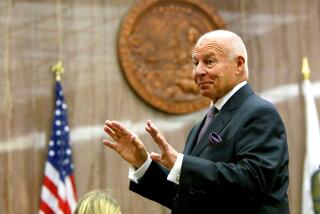Corporate Lawyers Serve the Investors, SEC Chief Insists
- Share via
WASHINGTON — The head of the Securities and Exchange Commission warned corporate lawyers Monday that they will face growing federal regulation unless they fight fraud from within their companies.
Corporate lawyers, like auditors, have sometimes forgotten that their “ultimate client” is the investing public, Harvey L. Pitt, the beleaguered SEC chief, told business lawyers at the annual meeting of the American Bar Assn.
“Lawyers for public companies represent the company as a whole and its shareholder owners, not the managers who hire and fire them,” he said. “This should be self-evident, but recent events indicate some corporate lawyers have lost sight of this axiom.”
The public’s anger over the wave of corporate scandals has focused mostly on chief executives who got rich while hiding the trouble facing their companies, and secondarily on the accountants who failed to reveal the facts about these schemes.
But corporate lawyers also share some of the blame, Pitt said. In some instances, they played a key role in structuring schemes that deceived investors, while others helped to cover up the frauds.
In the recently enacted corporate reform law, Congress required the creation of an oversight board to set rules for the accounting profession.
In a little-noticed provision, the law also requires the SEC, within six months, to set “minimum standards for professional conduct for attorneys.” Lawmakers said lawyers have a duty to reveal evidence of potential illegal conduct to the company’s directors.
Pitt said this provision reflects a growing skepticism in Congress over whether the “legal profession can police itself.”
Pitt himself has become a divisive figure because of his past close ties with the accounting industry. Several top lawmakers, including Senate Majority Leader Tom Daschle (D-S.D.) and Sen. John McCain (R-Ariz.), have called for Pitt’s resignation.
Traditionally, lawyers, like accountants, have been regulated by their peers. State bar associations hear complaints about lawyers and can discipline those who violate ethics rules.
“But I have to say I’m not impressed, or pleased” by the response of the state bars when informed by the SEC of complaints about lawyers, Pitt said.
Last year, before the collapse of Enron Corp., the ABA was debating whether to change the ethics rules to require in some cases that lawyers reveal their clients’ misdeeds.
That idea clashed with a basic rule governing how lawyers operate. The standard rule of attorney-client privilege assumes the lawyer will keep secret what he or she learns from a client.
Reformers argued that the ethics rules should be changed to put the public’s interest first, even if it means betraying a client’s confidence.
ABA members were divided and failed to agree on a change in the rules. However, the new corporate reform act took the issue out of the ABA’s hands, at least for company lawyers.
Last month, when Congress was debating the corporate reform law, the ABA’s leaders strongly opposed the rules for lawyers. But after Pitt’s speech Monday, the group’s incoming president had a muted reaction.
“We all agree that after Enron, we are operating in a new environment,” said ABA President-elect Alfred P. Carlton, a business lawyer from Raleigh, N.C. “He was reminding us that we have public responsibilities as lawyers, and I agree with him on that. My duty is to the corporate entity, not necessarily to the management that hires me.”
For Pitt and the SEC, the week ahead will likely be a busy one. Wednesday is the deadline for the chief executives of more than 900 companies to certify in writing the accuracy of their financial reports.
Pitt said the agency expects to file a record number of civil prosecutions this year. And he predicted more criminal charges against corporate executives.
More to Read
Inside the business of entertainment
The Wide Shot brings you news, analysis and insights on everything from streaming wars to production — and what it all means for the future.
You may occasionally receive promotional content from the Los Angeles Times.











